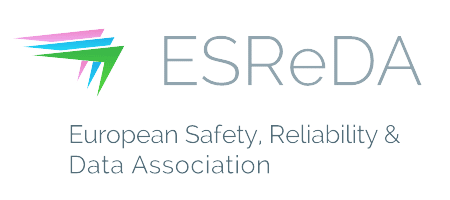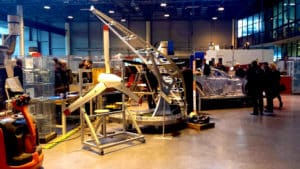
Contexte
Le 54ème séminaire ESReDA sur le risque, la fiabilité et la sécurité des systèmes énergétiques dans les milieux côtiers et maritimes se tiendra à Nantes du 25 au 26 avril 2018, hébergé par l’Université de Nantes et ORGANISE EN COLLABORATION AVEC le WEAMEC.
Dans le domaine des Énergies Marines Renouvelables, Il existe de nombreuses questions techniques et des défis humains où le risque, la fiabilité et la sécurité sont impliqués: évaluation incertaines des ressources (vent, vagues, courants), fiabilité du matériel, fiabilité des systèmes complexes, optimisation du réseau électrique, collision avec les navires, gouvernance des risques dans les zones à multi-usage (pêche, tourisme, transport maritime, défense européenne).
Le 54ème seminaire ESReDA
L’objectif du 54ème séminaire ESReDA est de rassembler des scientifiques, des ingénieurs et des décideurs dans le domaine de la sécurité des systèmes d’ingénierie complexes, du SHM, de l’évaluation des coûts et de la gestion des risques afin de présenter et discuter de méthodologies innovantes et d’applications pratiques relevant de la de la fiabilité des systèmes complexes, des risques économiques et des risques humains dans un environnement complexe. Les méthodologies scientifiques, les problèmes théoriques et les études de cas pratiques devraient couvrir toute la gamme des applications universitaires aux applications industrielles, y compris l’électromécanique et le génie civil.
Thèmes du séminaire:
-
- Conception et optimisation basées sur la fiabilité (y compris les problèmes structurels, matériels et électromécaniques);
- Extension de la durée de vie en service;
- Risques durant les opérations en mer et durant la durée de vie d’exploitation dans une zone à multi-usages;
- Quantification de la robustesse des systèmes complexes;
- Optimisation du réseau électrique et gestion des actifs;
- Évaluation et optimisation du cycle de vie;
- Fiabilité structurelle et mécanique, y compris les systèmes électromécaniques
- Modèles de dégradation probabiliste;
- Valeur ajoutée du SHM et optimisation de l’inspection, de la maintenance et de la réparation;
- Évaluation des risques et théorie de la décision;
- Procédures de calcul en analyse et optimisation;
- Conséquences des défaillances sur les vies humaines, les activités et les dommages environnementaux;
- Modélisation organisationnelle et sociétale;
- Études de cas industriels sur les structures côtières et les EMR.
PROGRAMME
Day 1: April 25th 2018
08h45-09h15 Registration and welcome coffee09h15-9h45 Welcome to participants from ESReDA, Université de Nantes and Chairman of the Conference
09h45-10h30 Keynote lecture: “Risk, Reliability and Safety of Energy Systems in Coastal and Marine Environments”, JD. Sorensen (Aalborg University)
10h30-10h50 Coffee Break
10h50-12h30 Session 1: Risk at sea: key issues, perception and evaluation
-
- “From risk perception to risk estimation”, paper #54-19, by F-M Jégoux (Freelance Human Factors specialist, France).
- “Indicators for Energy Sea Routes”, paper #54-8, by J. Piedade, C. I. Fernandes (Instituto Português de Relações Internacionais, Portugal), Pedro Morais (Instituto Politécnico de Setúbal, Portugal).
- “Sociotechnical Evaluation of Anchorings and offshore FLOating Wind Energy Risks: a first study on in service resilience”, paper #54-28, by G. Proutière-Maulion,F. Schoefs, B. Tran (Université de Nantes, France).
- “Comparative energy scenarios: solving the capacity sizing problem on the French Atlantic Island of Yeu”, paper #54-10, by R. Loisel, L. Lemiale (Université de Nantes, France).
- “Improvement of the Energy Production Capability a Improvement of the Energy Production Capability by Using Electrical Conversion Technology Based on 2-star Generators”, paper #54-3, by C. Olmi, F. Scuiller, J-F. Charpentier (Ecole Navale, France)
12h30-14h00 Lunch
14h00-15h30 Session 2a: Marine Renewable Energy Structure and Systems reliability
-
- “Assessment of Reliability in a Sea of Risk”, paper #54-6, by P. Johannesson, T. Svensson (RISE, Sweden), E. Buck, A. Shanks (The European Marine Energy Centre, UK), C. Jia, Chong Ng (ORE Catapult, UK)
- “A Kriging based procedure for the certification of wind turbine structures: application to large scale models”, paper #54-23, by Q. Huchet (Université Clermont Auvergne/EDF R&D, France), C. Mattrand, P. Beaurepaire, N. Gayton (Université Clermont Auvergne, France), N. Relun (EDF R&D, France)
- “Reliability evaluation of an offshore platform using FMEA enhanced by TOPSIS”, paper #54-30, by I. Dagkinis, G. Leventakis, N. Nikitakos (University of Aegean, Greece).
- “Probabilistic model of an offshore monopile foundation taking into account the soil spatial variability”, paper #54-32, A. K. El Haj, A. H. Soubra, J. Fajoui, (University de Nantes, France), T. Al-Bittar (Lebanese University, Liban).
15h30-16h00 Coffee Break
16h00-17h10 Session 2b: Marine Renewable Energy Structure and Systems reliability
-
- “Accounting for roughness of marine growth for probabilistic modelling of wave-structure interaction”, paper #54-29, by A. Bakhtiari, F. Schoefs (Université de Nantes; France), C. Berhault (Centrale Nantes, France), A. Ameryoun (Capacités, France).
- Reliability assessment of monopile structures subjected to bio-colonisation of marine growth”, paper # 54-14, T-B. Tran, F. Schoefs (Université de Nantes, France)
- “Statistical analysis of Mooring loading of a buoy through FOS and use in risk analysis”, paper #54-27, by F. Schoefs, C. Lupi (Université de Nantes, France), X. Chapeleau (IFSTTAR, France).
17h10-17h40 Keynote lecture: “Presentation of MRE research in Pays de la Loire: West Atlantic Marine Energy Community”, P. Baclet (CEO of WEAMEC, France)
17h50-19h30 ESReDA General Assembly
20h00 Seminar Dinner
Day 2: April 26th 2018
08h30-09h00 Welcome coffee
09h00-09h30 Keynote lecture: “Next H2020 calls in MRE”, F. Kermagoret (Univ. Bretagne Loire)
- “Calculation of the Unavailability’s an Offshore Wind Turbine Farm and a Tidal Turbine Farm”, paper #54-7, by L. Barthélemy (ENSM, France).
- “Risk Assessment for LNG and Oil terminals – Operator‘s Expertise in Practice”, paper #54-31, by L. Mataitis (AB Klaipėdos nafta, Lithuania), F. Anusauskas (Coastal Research and Planning Institute, Lithuania), I. Žutautaitė (Lithuanian Energy Institute, Lithuania).
- “Optimizing terminal logistics by discrete event simulation”, paper #54-12, by S. Landsverk Isaksen (Safetec Nordic)
- “Optimisation of preventive maintenance of offshore wind turbine”, paper #54-33, by T-B Tran, F. Schoefs (Université de Nantes, France, Norway).
11h00-11h20 Coffee Break
11h20-12h40 Session 4: Stochastic degradation processes of marine structures
- “A two-dimensional diffusion process as a degradation model”, paper #54-1, by M. Lefebvre (Polytec. Montréal, CA).
- “Probabilistic Assessment of Chloride Ingress Processes into Cracked Reinforced Concrete”, paper #54-16, by X-H Wang (Shanghai Maritime University, China), E. Bastidas-Arteaga (Université de Nantes, France)
- “A stochastic study of the hygro-elastic behavior of composite materials: application to the durability of renewable marine energy structures”, paper #54-18, by A. Clément, G. Bhati, S. Fréour, F. Jacquemin (Université de Nantes, France).
- “Time-variant fatigue up-dating of steel offshore wind turbines from SHM monitoring”, paper #54-25, B. Rocher (STX France Solutions, France), F. Schoefs, M. Chevreuil, L. Hawchar, M. François, C.P. El Soueidy (Université de Nantes, France)
12h40-14h00 Lunch
14h00-15h10 Session 5a: Non Destructive Testing, Monitoring and Diagnosis of Marine Renewable Energy materials, structures and devices
- “RiaSoR2: Reliability of Ocean Energy Devices supported by a Condition Monitoring Guidance”, paper #54-2, by J. Hüffmeier (RISE, Montréal, Sweden), O. Staven (Synective Labs, Sweden), M. Johanson (Alkit Communications, Sweden), O. El Mountassir (ORE Catapult, UK)
- “Modeling of a Multi-hazard degradation mechanism with a Lévy process based on ILI (In-Line) Inspections”, paper #54-11, by R. Amaya-Gómez (Université de Nantes, France/ Los Andes University, Colombia), M. Sánchez-Silva, F. Muñoz (Los Andes University, Colombia), E. Bastidas-Arteaga, F. Schoefs (Université de Nantes, France).
- “A semi-probabilistic approach for optimizing quantiles in the diagnoses of hydropower penstock pipes”, paper #54-15, by E. Ardillon (EDF-R&D, France), P. Bryla (EDF-DTG, France), A. Dumas (PHIMECA Engineering, France).
15h10-15h30 Coffee Break
15h30-17h00 Session 5b: Non Destructive Testing, Monitoring and Diagnosis of Marine Renewable Energy materials, structures and devices
- “Risk Based Damage Simulation & Monitoring for Wind & Tidal Turbines”, paper#54-13, by J-C. De Luca, T. Moro, (IRT Jules Verne, France).
- “Non-destructive methods for measuring chloride ingress into concrete: challenges for the future”, paper #54-17, by M. Torres-Luque (CAPACITÉS, France), E. Bastidas-Arteaga, F. Schoefs (Université de Nantes, France), M. Sánchez-Silva (Universidad de los Andes, Colombia).
- “Hybrid inspection-monitoring approach for optimal maintenance planning”, paper #54-24, by C. Geara (Saint-Joseph University, Lebanon/Université Clermont Auvergne, France), R. Faddoul Saint-Joseph University, Lebanon), Alaa Chateauneuf (Université Clermont Auvergne, France), Wassim Raphaël (Saint-Joseph University, Lebanon).
- “Monitoring strategy of mooring systems submitted to marine growth: a first sensitivity analysis and VoI approach”, paper #54-26, B. Decurey,*, F. Schoefs, P. Casari (Université de Nantes, France), H. Ameryoun (Capacités, France).
17h00-17h20 Conference Closure


